Summary of Water Committee Meetings
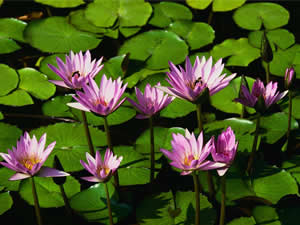 Recent Resolutions: The World Water Forum and Alternative Forums by Cathy Holt
Recent Resolutions: The World Water Forum and Alternative Forums by Cathy Holt
More extensive information on Water and Bioregionalism can be found in the WaterWorks Journal. It includes articles by David Haenke and Peter Berg and many others. For an excellent overview of the function and value of North America’s premier water managers, read Learning from the Ecological Engineers: Watershed Wisdom of the Beaver by Toby Hemenway
Some North American Bioregional Water Committee Reflections
by Barbara Helen Harmony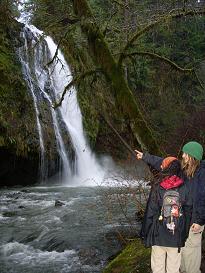
The Water Committee met initially at the first North American Bioregional Congress (NABC) in May of 1984. Water workers from across the continent designed a platform and wrote resolutions near Excelsior Springs, Missouri, in the Kansas Area Watershed.
We determined that Water is the basis of life on the planet and the primary organizing force of the bioregion. We promised to found a bioregional Water Network with Water Committee Members collecting and disseminating information. We were happy to learn the good water practices of Bioregionalists particularly the use of compost toilets.
In 1986 at the second NABC on the shores of Lake Michigan in the Leelanau Province of the Great Lakes Macroregion, the Water Committee shared stories of Water degradation and deepened our resolutions.
In 1988, at NABC lll, on Cheakamus river, Paradise Valley, Squamish Ish Bioregion in British Columbia, again resolutions were refined.
At the fourth NABC in 1990 in the Kennebec River Watershed on the Gulf of Maine, when the Water Committee met it was agreed that we should give thanks for to the Water. The morning the plenary session was to open, the Committee met on the banks of Lake Cobboseecontee and gave thanks to the water. The group joined the plenary session, bringing with us the purity and strength of purpose that we received from the water.
When the Committee met on the Guadalupe River in the Hill Country of Texas at the 5th Turtle Island Bioregional Gathering each person told about their water work. We than sat in silence in the circle as it rained for about 4 minutes, the same amount of time each person had spoken.
In 1994, at the 6th Turtle Island Bioregional Gathering, the Committee met on Otter Creek in Kentucky. We attempted to summarize the resolutions.
At the 1996 Gathering there was a good exchange of Water information covering a wide range of experiences. Once again it was remembered and noted that water speaks a universal language of oneness and sustains all life.
In July 2005, at the 9th CBC held at Earthaven Ecovillage in North Carolina, these Water Resolutions were passed by the full Congress:
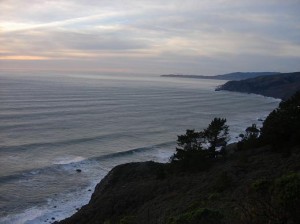
1. All people have a right to clean water. Water should not be commodified or privatized.
2. Water is best protected by local conscious communities.
3. We oppose over-development of watersheds, destructive logging, and destruction of habitat. We support replanting of native vegetation.
4. We support catchments of rainwater and water conservation and protection by agriculture, industry, and households. We support use of renewable energies.
5. In small human-made dams for power, flood prevention, or water storage and fish must get through and people affected must be involved. We oppose large dams.
Full Version of the Water Resolution proposed by the Water Committee (based on the Cochabamba Declaration, which was ratified by the CBC in 2003) also summarizes previous resolutions:
Preamble: Since water is life, let us give thanks to the water every time we drink and use it, recognizing water as a gift and blessing. Water belongs to the earth and all species and is sacred to life, therefore the world’s water must be conserved, reclaimed, and protected for all future generations and its natural patterns respected. All forms of water in the ground, the air, and on the land are connected. There is no new water; it is a closed system, which for eons has had a natural cleansing process - a process which we should not disturb.
1. Protection and conservation
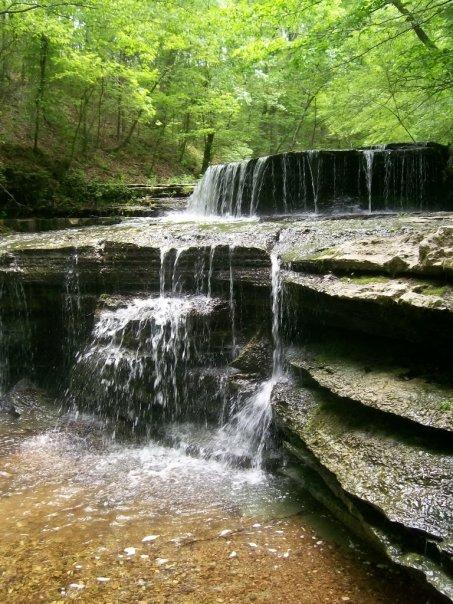
Because we seek protection for water at its source, we oppose logging and over-development of watersheds and support the replanting of trees to protect streams from sedimentation and land from erosion, and to restore the natural hydrological cycle based on transpiration from trees. We support citizen monitoring of waterways for greater awareness of water’s health.
We support catchments of rainwater, conserving water through water saving appliances, and advocate use of dry composting toilets, cleaning and reuising watewater with biological methods, and release of water without damage to the environment. We oppose using water as a carrier of waste.
We recommend that agricultural policy mandate installation of drip irrigation to conserve 60% of their current water use and improve yields while protecting the soil from salinization.
We recommend that industry adopt a zero emissions policy requireing treatment and recycling of the waste stream to prevent pollution from entering the air and waterways.
We oppose ground and surface water pollution from toxic rain, soil erosion, agricultural runoff, draining of marshes, channelization of streams, municipal waste water, landfills for municipal or toxic waste, dumps for radioactive waste, deep well injection of hazardous waste, depletion of aquifers, or any other degradation of water.
We seek protection for the fragile interfaces between water and land: the coastal estuaries, coral reefs and the outer continental shelf, as well as wetlands.
When dams are necessary for small hydroelectric power generation, flood prevention, or water storage, provision must be made for fish to get through. People affected by dam building must be consulted, compensated, and given a share in the benefits. We oppose large hydroelectric facilities, which damage ecosystems and people.
2. Opposing Privatization
Water is a fundamental human right and a public trust to be guarded by all levels of government; therefore, it should not be commodified, privatized or traded for commercial purposes. These rights must be enshrined at all levels. In particular, an international treaty must ensure all people on Earth have a right to water regardless of abiltity to pay, and all beings have a right to water.
We oppose use of bottled water, because it contributes huge amounts of waste plastic to the natural environment and landfills; bottled water is not as regulated as tap water and is often less safe.
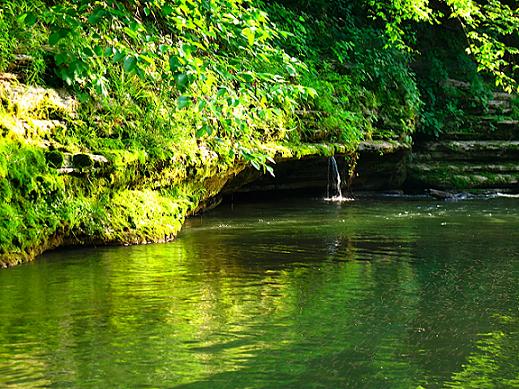 3. Other Policies
3. Other Policies
We are already seeing increased frequency and severity of storms, droughts, floods, rising oceans, and desertification. The burning of fossil fuels is the major cause of climate change. The most vulnerable are impoverished and indigenous peoples. We support developing renewable energies such as solar, wind, biomass and small hydro, in order to protect the natural water cycle. Fossil fuels such as coal and oil and all their by products are a major source of water pollution.
We should consider the present importation of water as a carrying capacity indicator of the whole watershed. Other indicators include: inches of rainfall (potential catchments), groundwater, and surface water.
World Water Forum and Alternative Forums by Cathy Holt
An International Gathering of Water Experiences was held in Mexico City in Mid-March ‘06. The conference, a preluce to the fourth World Water Forum, was to generate an inclusive space of reflection centered on the challenges societies are facing around the management and use of water. 1.1 billion people on earth lack access to safe drinking water. An average of 4,700 people die every day due to lack of potable water.
Barbara Harmony, Coordinator for the Water Committee of the Bioregional movement since 1984, was one of the speakers. Here address began, “My purpose here today is to talk about the changes in consciousness that I believe must occur for us to share water and use it wisely.” The Bioregional Water Committee’s resolutions formed a large part of her speech. (For the complete speech go here.)
While the World Bank, governments, and big corporations (20,000 attendees) at the 4th World Water Forum in Mexico City discussed plans for privatizing water, an Alternative International Forum in Defense of Water was taking place. Free and open to the public, this people’s forum met in city buildings, a union hall, and tents in public places.
An encampment of around 800 members of the National Assembly in Defense of Land and Water and Against Privatization (mostly indigenous peoples such as the Parota, whose land is being threatened by a dam and flooding) was held in the Monument to the Revolution.
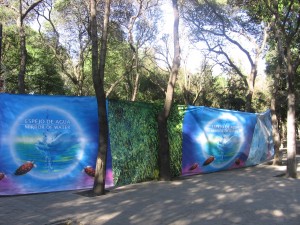 The Alternative Forum received funding of about $50,000 (500,000 pesos) from the Local Assembly of Mexico City. Space in public buildings, such as museums, was donated. Bioregionalists Arnold Ricalde (a former Green Party member of the government), Joscelyn Proctor, and Helen Samuels were some of the key organizers of the Alternative forums, especially the “Espejo de Agua” (Mirror of Water), a 5-day event which began with a Hopi-Aztec dance. there were workshops on water rights, a stage where educational skits, music and dance took place, a women’s teepee, tables for NGOs, a children’s area, and a “Green Room” for computers, media links, and film showings. Flower petals and colorful corn kernels combined to create complex and beautiful mandalas, which would be dismantled at the end. In a festive opening ceremony, some of the traditional grandmothers joined the younger women in a dance of blessing with copal and flowers.
The Alternative Forum received funding of about $50,000 (500,000 pesos) from the Local Assembly of Mexico City. Space in public buildings, such as museums, was donated. Bioregionalists Arnold Ricalde (a former Green Party member of the government), Joscelyn Proctor, and Helen Samuels were some of the key organizers of the Alternative forums, especially the “Espejo de Agua” (Mirror of Water), a 5-day event which began with a Hopi-Aztec dance. there were workshops on water rights, a stage where educational skits, music and dance took place, a women’s teepee, tables for NGOs, a children’s area, and a “Green Room” for computers, media links, and film showings. Flower petals and colorful corn kernels combined to create complex and beautiful mandalas, which would be dismantled at the end. In a festive opening ceremony, some of the traditional grandmothers joined the younger women in a dance of blessing with copal and flowers.